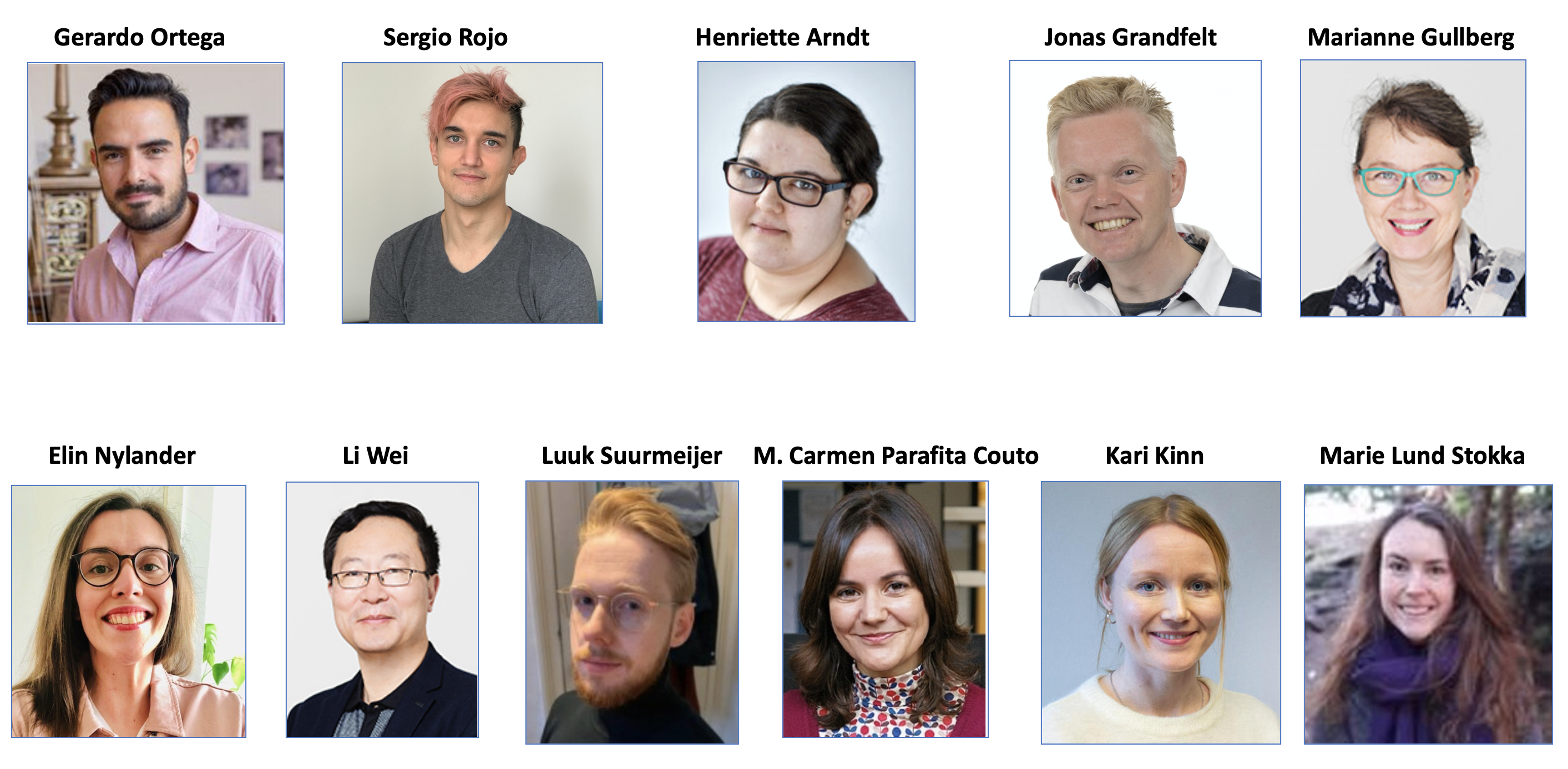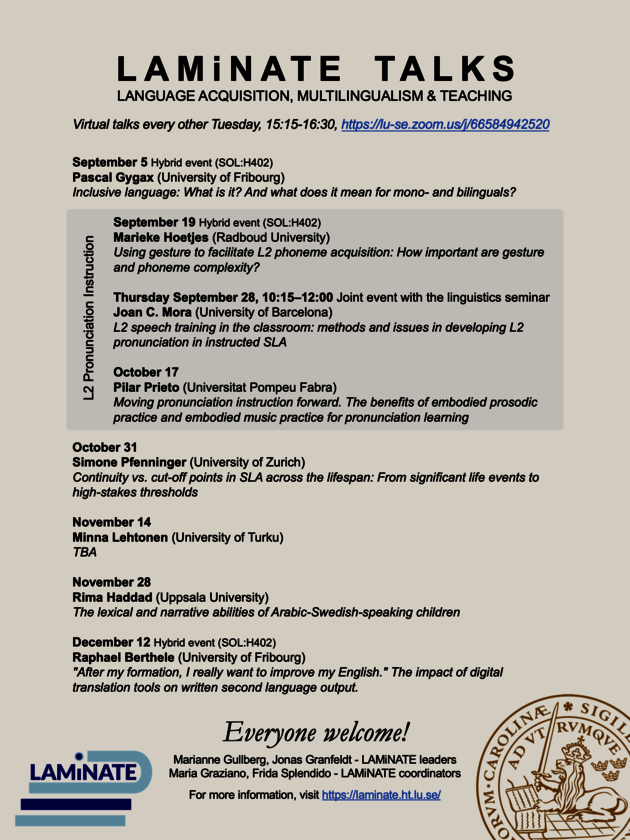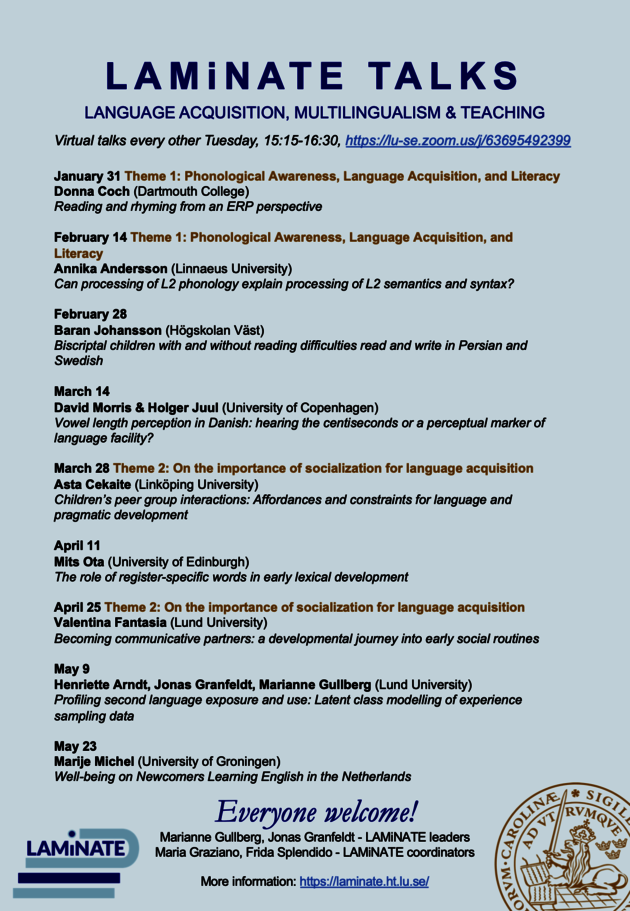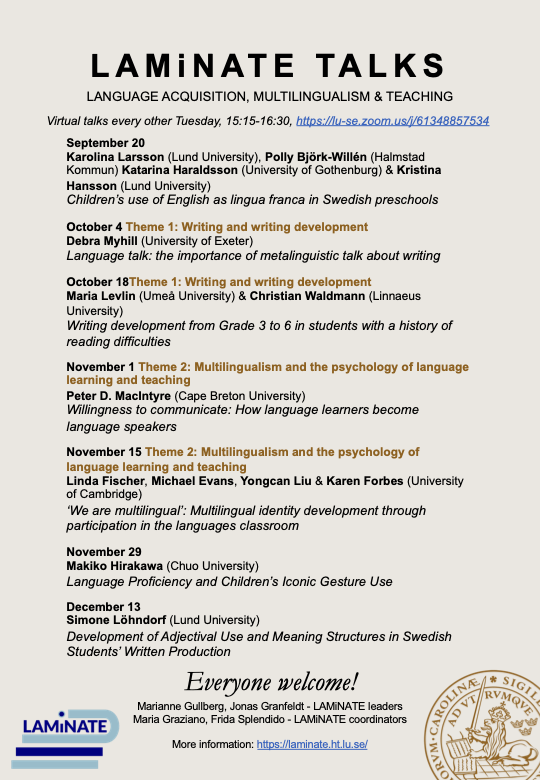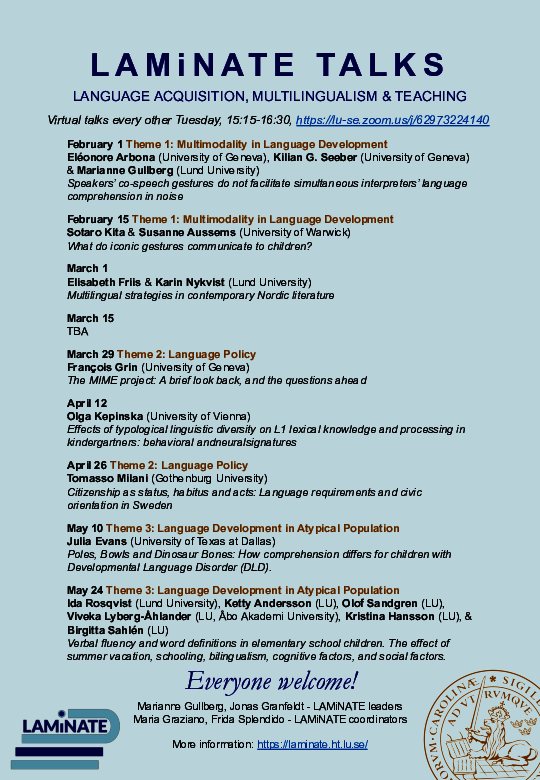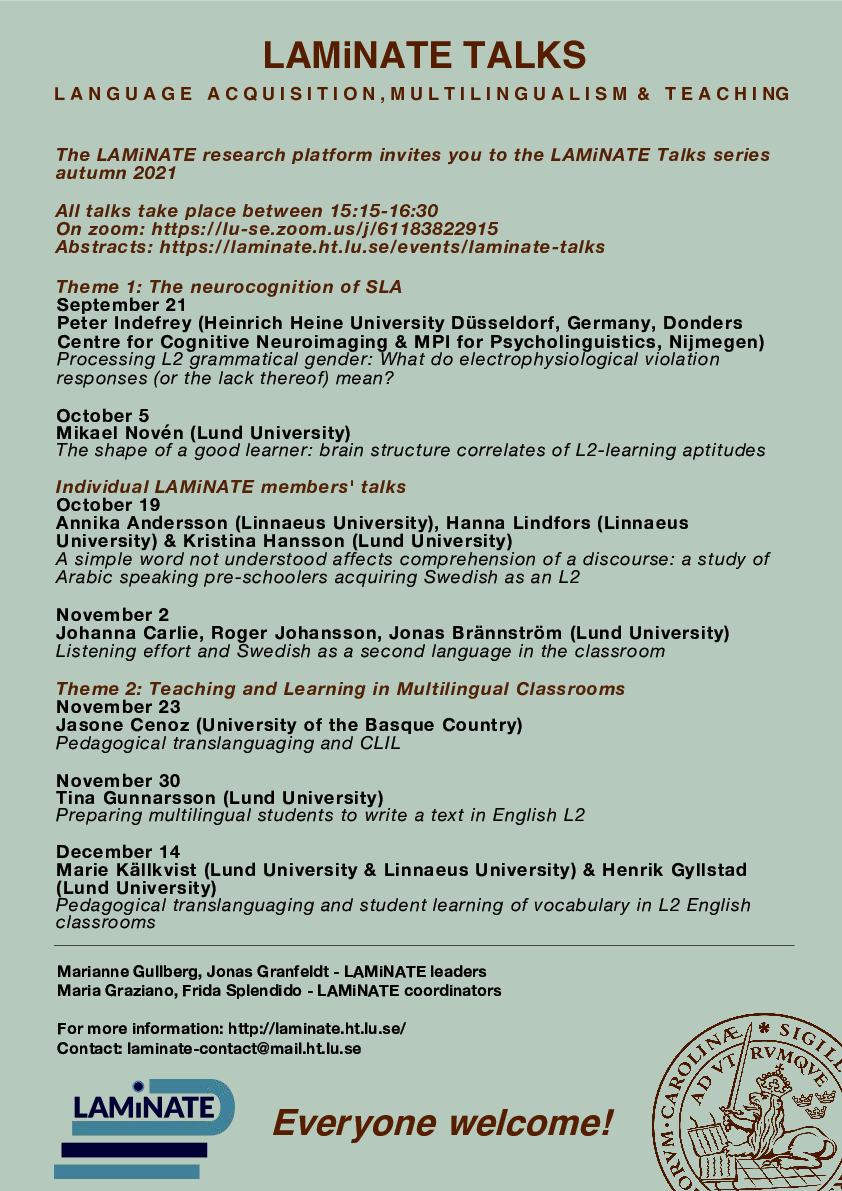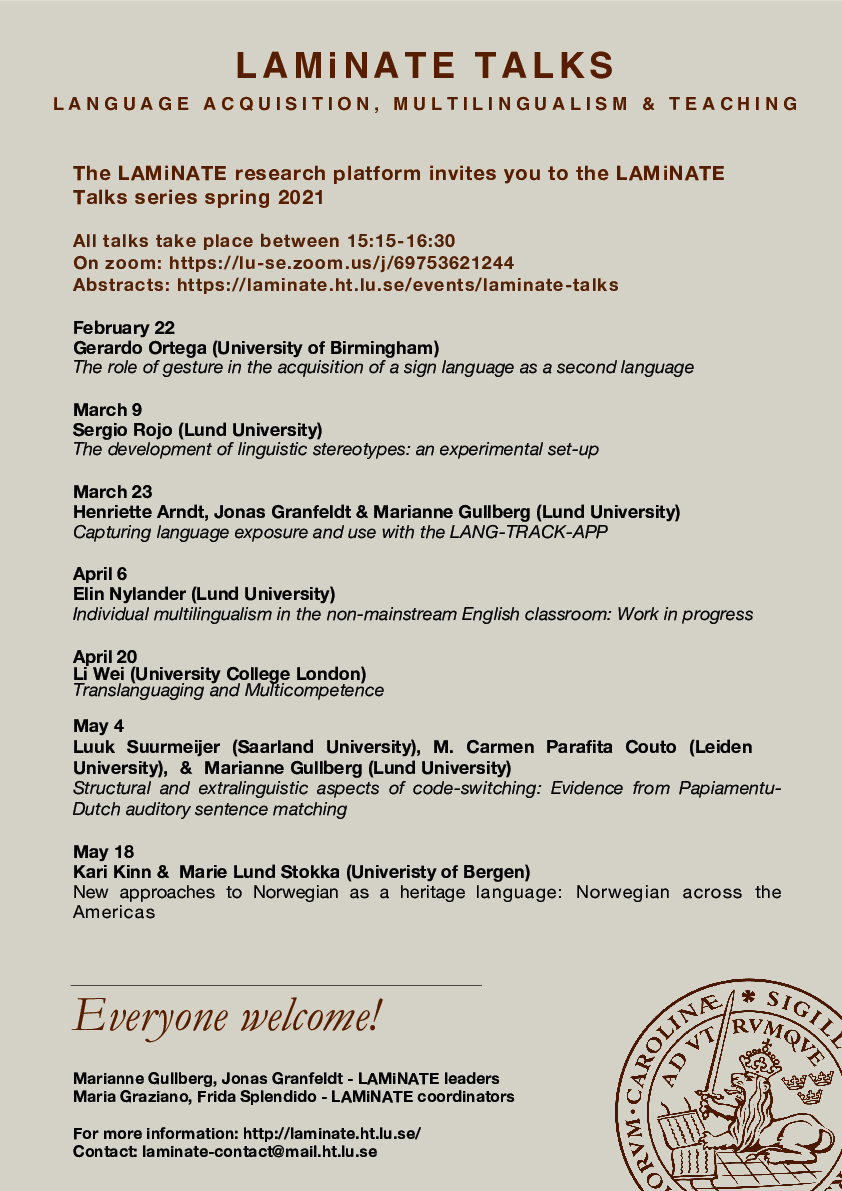Past LAMiNATE Talks
Spring 2024
The spring Talks series of 2024 hosted 8 events. The series was organised in two thematic blocks, comprising two talks each, and presentations by guest speakers and LAMiNATE members.
The first theme was organised by LAMiNATE member Maria Graziano (LU) and will discuss Some aspects affecting the development of reference tracking. The two talks in this theme discussed two factors that influence the mastery of referential expressions. In the first talk, Josefin Lindgren (Uppsala University) & Jorrig Vogels (University of Groningen) focused on how presenting (Swedish) children with a model story affects their choice of referential expressions in their narratives. In the second talk, Jennifer Arnold (University of North Carolina, Chapel Hill) examined which patterns influence speakers’ and learners’ interpretation of ambiguous pronouns.
The second theme was organised by LAMiNATE member Roger Johansson (LU) and will focus on Neural foundations for the flexible switching between languages. This theme included presentatations by Christos Pliatsikas and Roger Johansson.
Autumn 2023
The autmn Talks series of 2023 hosted 8 events (some online, some in a hybrid format). The series offered one thematic block comprising three talks.
We offered a thematic block consisting of three talks, organised by Gilbert Ambrazaitis and Frida Splendido. The block focused on the How? of L2 pronunciation instruction with a particular attention to the potential benefits of using gestures in two of the talks. In the first of the three talks, Marieke Hoetjes presented a study on the effect of phoneme and gesture complexity on L2 phoneme acquisition. In the second talk, Joan C. Mora discussed challenges in L2 pronunciation instruction, specifically in communicative language teaching. In the third and final talk, Pilar Prieto reported on a series of studies exploring the potential impact of embodied practices on L2 pronunciation.
Outside of the thematic sessions, the autum series included presentations by guest speakers and LAMiNATE members: Inclusive language: What is it? And what does it mean for mono- and bilinguals? by Pascal Gygax (University of Fribourg), Continuity vs. cut-off points in SLA across the lifespan: From significant life events to high-stakes thresholds by Simone Pfenninger (University of Zurich), Cross-language generalization in treatment of multilingual aphasia: a meta-analysis by Minna Lehtonen (University of Turku), The lexical and narrative abilities of Arabic-Swedish-speaking children by Rima Haddad (Uppsala University), "After my formation, I really want to improve my English." The impact of digital translation tools on written second language output by Raphael Berthele (University of Fribourg).
Spring 2023
The spring Talks series of 2023 hosted 9 events (some online, some in a hybrid format). The series offered two thematic blocks comprising two talks each.
The first theme, Phonological awareness, language acquisition, and literacy, was organized by LAMiNATE member Annika Andersson. The first presentation was given by Donna Coch (Dartmouth College) who presented ERP studies of phonological processing in L1 in relation to literacy and discussed what the findings suggest about the nature of lexical representations in reading. The second was given by Annika Andersson (Linnaeus University) who presented a study of L2 phonological processing in bilingual children and related this to processing of semantics and syntax in the same language.
The second theme, On the importance of socialization for language acquisition, was organized by LAMiNATE member Petra Bernardini. Valentina Fantasia presented on the interaction child–caregiver in early language socialization and Asta Cekaite’s talk focused on peer interaction and socialization.
Outside of the thematic sessions, the spring series included presentations by guest speakers and LAMiNATE members: Biscriptal children with and without reading difficulties read and write in Persian and Swedish by Baran Johansson (Högskolan Väst), Vowel length perception in Danish: hearing the centiseconds or a perceptual marker of language facility? by David Morris & Holger Juul (University of Copenhagen), The role of register-specific words in early lexical development by Mits Ota (University of Edinburgh) and Profiling second language exposure and use: Latent class modelling of experience sampling data by Henriette Arndt, Jonas Granfeldt, Marianne Gullberg (Lund University). The spring series finale hosted a presentation by Marije Michel (University of Groningen) on Well-being on Newcomers Learning English in the Netherlands.
Autumn 2022
The autumn Talks series of 2022 hosted 7 events with presentations given both by LAMiNATE members at Lund University and by international colleagues. The talks continued mostly in the virtual modality, with some hybrid events when speakers could present onsite.
The majority of the talks was structured into two thematic blocks.
The first theme was Writing and writing development and is led by LAMiNATE member Victoria Johansson. Writing development is closely intertwined with the general linguistic development (in L1 as well as L2) during the school years and beyond. The linguistic features (such as grammatical, lexical and rhetorical aspects) acquired through writing will impact the overall linguistic and cognitive development – and at the same time, writing is in itself an important tool to learn. The two talks within this theme were given by Debra Myhill and Maria Levlin & Christian Waldmann. They focus on writing and writing development from an L1 perspective, and together they broadly address how the linguistic development is expressed in writing, including aspects of reading and writing difficulties and discussions about what happens after the school years.
The second theme was Multilingualism and the psychology of language learning and teaching and is led by LAMiNATE member Alastair Henry. The talks in this theme were given by Peter MacIntyre from Cape Breton University, and Linda Fischer and colleagues from the University of Cambridge. Peter MacIntyre’s talk focused on the complex process that underpin decision-making in relation to talking or not talking, the language in which communication is initiated, and the monitoring of ongoing interactions. The talk by the Cambridge researchers focused on language identities. They explore the ways in which identities connect to communicative repertoires, how multilingual identities develop, and how a multilingual outlook can support agency and engagement in language learning.
Besides the thematic sessions, talks were also given by LAMiNATE members: Karolina Larsson et al. (LU) who presented on Children’s use of English as lingua franca in Swedish preschools; Simone Löhndorf (LU) who presented on Development of Adjectival Use and Meaning Structures in Swedish Students’ Written Production. We also hosted a talk on Language Proficiency and Children’s Iconic Gesture Use given by Makiko Hirakawa (Chuo University).
Spring 2022
The spring Talks series of 2022 hosted eight presentations given both by LAMiNATE members and local researchers at Lund University and by international colleagues. We continued primarily in the virtual modality but included a few hybrid talks. The majority of the talks were structured in three thematic blocks.
There were two presentations in our first theme, Multimodality in Language Development: one by Eléonore Arbona (University of Geneva), Kilian G. Seeber (University of Geneva) and Marianne Gullberg (Lund University), and one by Sotaro Kita and Susanne Aussems (University of Warwick).
The second theme, Language Policy, regrouped presentations by François Grin and Tommaso Milani.
Our third and final thematic session, Language Development in Atypical Population, included two presentations: one by Julia L. Evans (University of Texas) and one by Ida Rosqvist (Lund University), Ketty Andersson (Lund University), Olof Sandgren (Lund University), Viveka Lyberg-Åhlander (Lund University, Åbo Akademi University), Kristina Hansson (Lund University), and Birgitta Sahlén (Lund University).
Outside of the three themes, we hosted a presentation on Multilingual strategies in contemporary Nordic literature by Elisabeth Friis and Karin Nykvist (Lund University), as well as a presentation by Olga Kepinska (University of Vienna) on Effects of typological linguistic diversity on L1 lexical knowledge and processing in kindergartners.
AUTUMN 2021
In autumn 2021 we hosted seven talks. We started with the theme The neurocognition of SLA that included two talks on the structure, connections, and electrical activity of the second-language acquiring brain. The speakers in this theme were Prof. Peter Indefrey (Heinrich Heine University Düsseldorf, Germany; Donders Centre for Cognitive Neuroimaging & Max Planck Institute for Psycholinguistics, Nijmegen, The Netherlands) and Dr. Mikael Novén (Lund University) who discussed changes in the neural electrical patterns of learners exposed to a new gender system, brain configurations and wirings that increase aptitude for specific language skills, and much more.
We then continued with two individual presentations from LAMiNATE members (Annika Andersson, Hanna Lindfors & Kristina Hansson and Johanna Carlie, Roger Johansson & Jonas Brännström).
We ended with three talks on the theme of Teaching and Learning in Multilingual Classrooms. All three presented classroom research where pedagogical translanguaging was implemented as a means of facilitating student learning through activating their prior knowledge. Jasone Cenoz discussed pedagogical translanguaging in the teaching of content classes whereas Tina Gunnarsson and Marie Källkvist & Henrik Gyllstad reported research in L2 English classrooms, focusing on writing (Gunnarsson) and vocabulary learning (Källkvist & Gyllstad).
SPRING 2021
In spring 2021, we hosted seven talks given both by LAMiNATE members at Lund University and by international colleagues. You can see speakers in the picture below, read and download the abstracts below.
Attendees to all seminars were numerous: with an average of about 30 participants each event we reached an all-time high of 61 attendees at the talk given by prof. Li Wei.
The talks being virtual, participants could join from several different countries.
